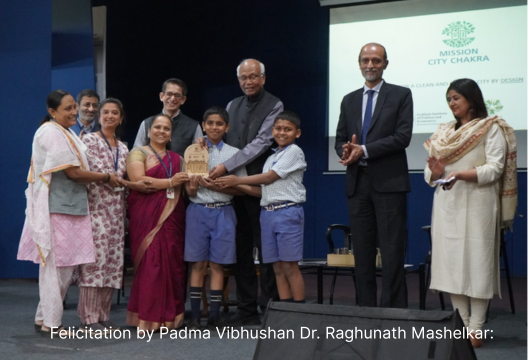Inspiring journey towards Sustainability and Holistic Education.
Under #principalsonthemision , Climatora had the privilege of sitting down with Anita Darvatkar, Principal of Vanaz Parivar Vidya Mandir, to discuss the school’s inspiring journey towards sustainability and holistic education.
Climatora: Ms. Darvatkar, thank you for speaking with us. Could you start by telling us a bit about the history and evolution of Vanaz Parivar Vidya Mandir?
Anita Darvatkar: It’s my pleasure. Our school was established in 1978 by Shri S.K. Khandekar, the Managing Director of Vanaz Engineers Ltd. We started with just 50 students, primarily children of Vanaz employees. Over the years, we’ve expanded significantly and now proudly serve over 1000 students from across the wider community. It’s been incredibly rewarding to witness this growth, not just in numbers but in spirit. Our founding members, like the late Appa Kulkarni, Limaye Sir, Bhavebai, and Datebai, were instrumental in nurturing this institution. Today, under the leadership of Shri Nitin Kulkarni (President), Shri Y.K. Kadam (Secretary), Shri Vinod Sakpal (Treasurer), Shri A.L. Deshmukh (Trustee), and Shri Ajay Mohol (Advisor), and with the dedication of our staff, we’ve built a school renowned for its discipline, values, and commitment to holistic education.
Climatora: That’s a remarkable journey. Beyond academics, your school seems to have some unique traditions. Could you tell us about “Baba Day”?
Anita Darvatkar: Absolutely. “Baba Day,” celebrated every year on February 14th, is one of our most cherished traditions. On this day, we invite the fathers of our students to school to celebrate their vital role in our children’s lives. It’s a truly heartfelt occasion that brings our entire school community together in a very meaningful way.
Climatora: It sounds like a wonderful way to foster community. We also understand your students are involved in community-centered environmental initiatives. Can you elaborate on those?
Anita Darvatkar: Yes, our students actively participate in such efforts. One significant activity is our river-cleaning initiative, where we take students to clean the nearby Mutha River. This goes beyond just cleanliness; it’s about building awareness, helping children see the direct impact of their actions, and instilling a sense of responsibility for the environment around them.
Climatora: That directly ties into your recent commitment to sustainability. What inspired your school to join Mission City Chakra, and what steps did you take?
Anita Darvatkar: Our desire to cultivate conscious, responsible citizens truly inspired our participation in Mission City Chakra. On January 26th, 2024, during our Republic Day celebration, I took a pledge along with our students, teachers, parents, and alumni: to eliminate the use of plastic tiffin boxes, plastic bottles, and plastic or laminated book covers from our school starting from the academic year 2024–25.
This wasn’t merely a symbolic gesture. When I fully grasped the long-term effects of plastic—how it degrades into microplastics that infiltrate our food, water, and even air—I knew we had to act. Pune has over a thousand schools, and even one school making such a change can create a significant ripple effect. We strongly encouraged our students to switch to steel tiffin boxes and water bottles, and to use either paper covers or no covers at all for their textbooks. It’s a small shift in daily habits, but a substantial stride toward long-term environmental impact.
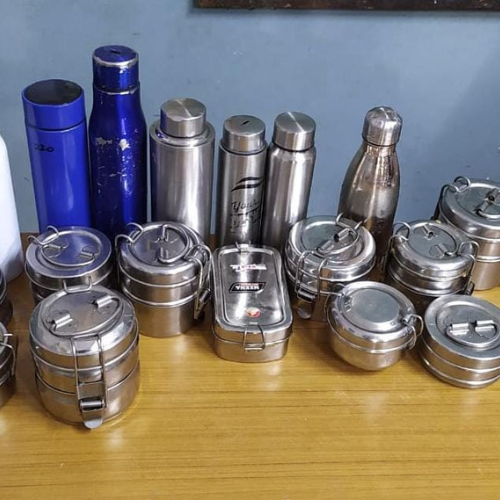
Climatora: And your efforts received recognition, which must have been encouraging.
Anita Darvatkar: Indeed! Our initiatives were recognized in February 2024 at the Mission City Chakra School Conclave, and this acknowledgment deeply motivated us to pursue further sustainability goals.
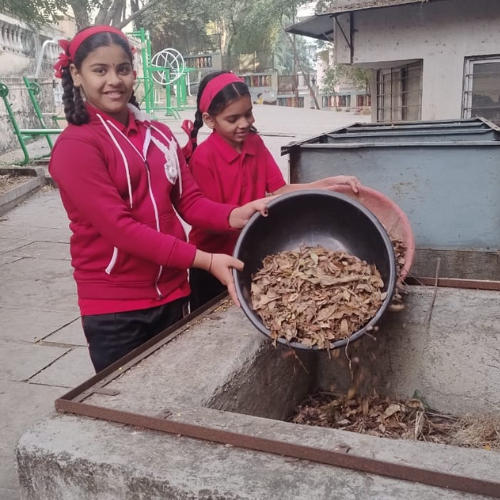
Climatora: So, what’s next on Vanaz Parivar Vidya Mandir’s sustainability journey? Are you aiming for a truly zero-waste campus?
Anita Darvatkar: We are actively working towards becoming a truly zero-waste school. One of the initial challenges we identified was the significant amount of dry leaf waste generated by our large green campus. Instead of seeing it as a problem, we transformed it into an opportunity. We initiated a project for composting and mulching using these dry leaves. What’s particularly special is that this project is managed by our sixth-grade students. They learn the science behind composting and the responsibility involved firsthand.
Climatora: That’s a fantastic hands-on learning experience. What are you doing with the compost?
Anita Darvatkar: This compost is now being used to create a butterfly garden right here on our campus. Our objective isn’t just to beautify the space, but to provide students with a unique experiential learning opportunity. They will be able to observe the butterfly life cycle in real-time, which is part of their curriculum. More importantly, they’ll learn about nature, ecological balance, and how every small action can nurture life. In a rapidly urbanizing city like Pune, creating even a small sanctuary for pollinators is profoundly meaningful.
Climatora: Beyond the campus, how do you connect students with the broader environment of Pune?
Anita Darvatkar: We often take students on field visits to places like the Mutha River to educate them about our local environment and history. During one such recent visit, many students experienced the Pune Metro for the first time, turning the day into a multi-dimensional learning experience. For many, it was a new and exciting way to understand their own city, its natural resources, and how development and sustainability can coexist.
Climatora: You’ve been with the school for many years, starting as a teacher. How has your personal journey influenced your approach to education and leadership at Vanaz Parivar Vidya Mandir?
Anita Darvatkar: My journey here has been deeply fulfilling. I began my career as a teacher after completing my B.A. in Marathi and D.Ed. Throughout these years, I’ve always believed in striking a balance between discipline and warmth. I’ve worked to improve student grooming and discipline while also introducing innovative approaches like peer learning systems, “Bal Sabhas” (Children’s Committees), and engaging visual displays to make the school environment more interactive and stimulating.
Climatora: It sounds like a truly holistic approach. What makes you most proud of your students, especially given their diverse backgrounds?
Anita Darvatkar: Most of our students come from modest backgrounds, yet they consistently demonstrate extraordinary potential. I feel immense pride when I see them win awards in such diverse fields—from excelling in science exhibitions to captivating audiences in folk dance competitions. Our students have brought home medals from international competitions in Silambam and Lathi-Kathi, topped state-level folk dance events, and excelled in competitions like elocution and the Manthan exam. Behind every student’s success is a dedicated team of teachers who truly go the extra mile every single day.
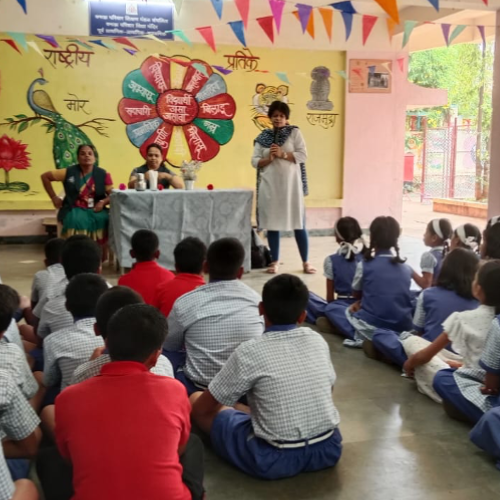
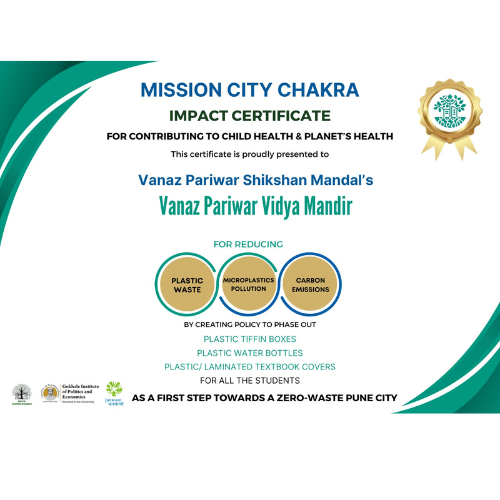
Climatora: Finally, Ms. Darvatkar, how do you see the school’s sustainability journey reflecting its core educational philosophy?
Anita Darvatkar: At Vanaz Parivar Vidya Mandir, we fundamentally believe that education must extend beyond the confines of the classroom. It should shape values, inspire action, and build character. Our sustainability journey is a direct reflection of this belief. We don’t just teach about climate change; we take concrete steps to reduce our own impact. We don’t just celebrate events; we imbue them with meaning. We don’t just prepare students for exams; we prepare them for life.
We are truly grateful to be a part of Mission City Chakra. It has not only given us a platform to share our work but has also connected us with other like-minded institutions striving for a more sustainable future. We are still learning, evolving, and trying. But what matters most is that we’ve started—and we are wholeheartedly committed to continuing this vital journey.

